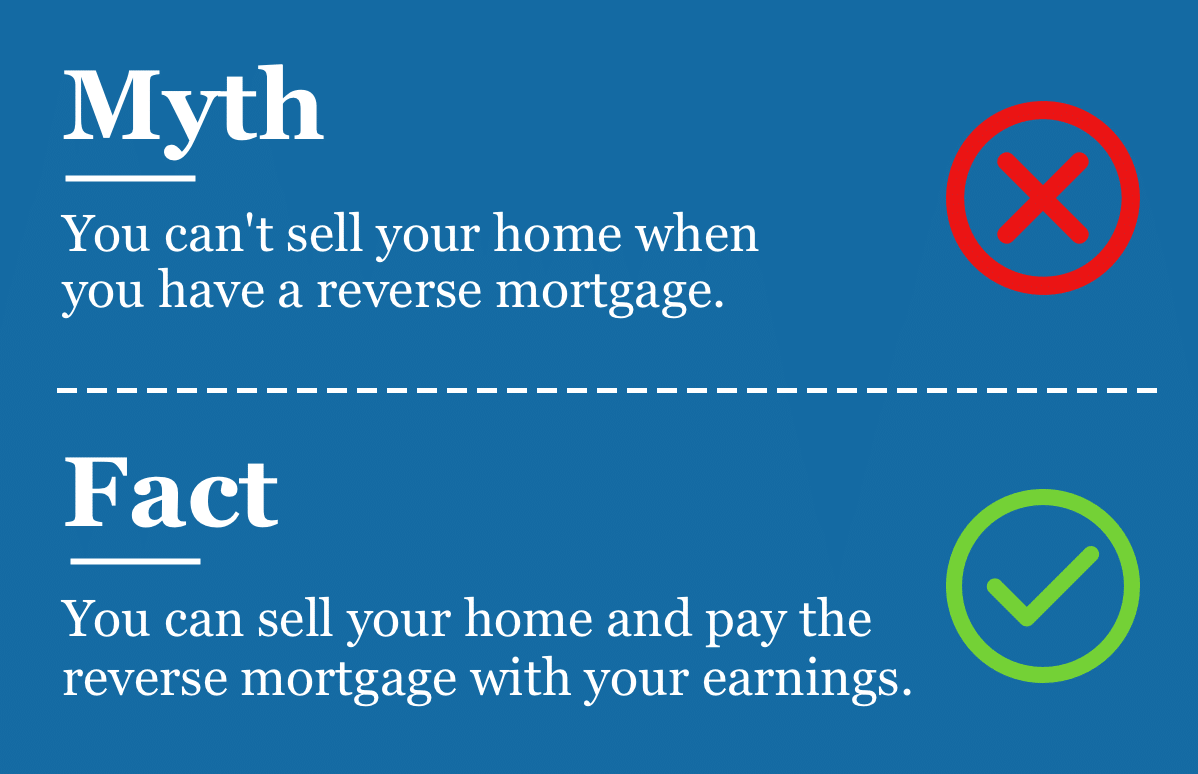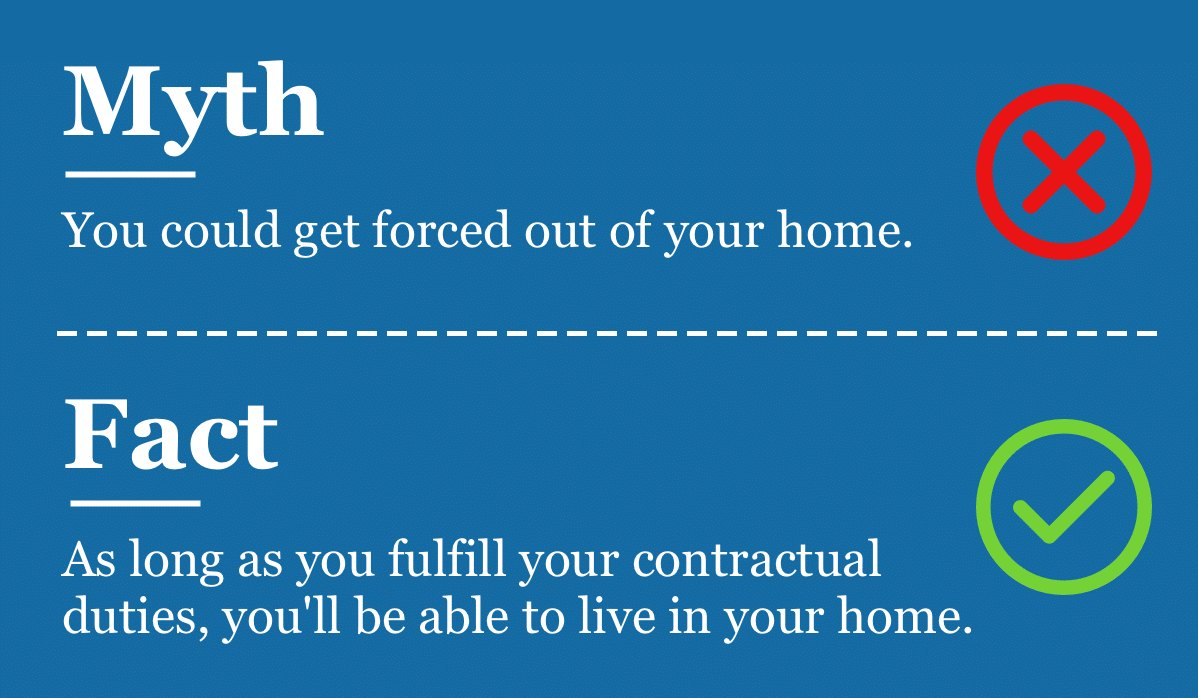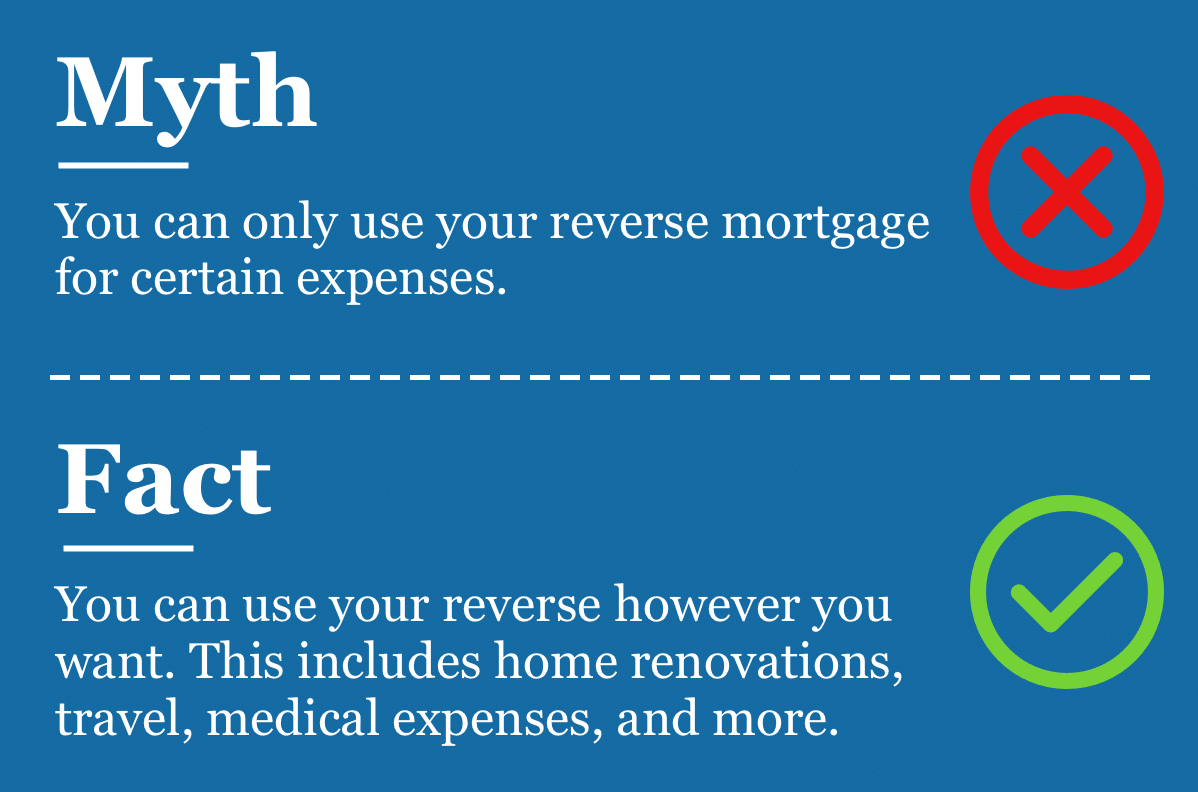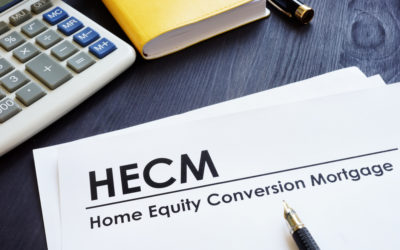- Myth 1: You won’t own your home anymore
- Myth 2: You’re required to make monthly mortgage payments
- Myth 3: Your children will be left with the debt
- Myth 4: To qualify for a reverse mortgage, you can’t have an existing mortgage
- Myth 5: You won’t be able to sell your home if you get a reverse mortgage
- Myth 6: A reverse mortgage will affect my Social Security and Medicare benefits
- Myth 7: Your heirs won’t be able to inherit the property
- Myth 8: You could get forced out of your home
- Myth 9: A reverse mortgage is costly and requires large out-of-pocket expenses
- Myth 10: Reverse mortgages should only be used as a last resort
- Myth 11: All of your funds are dispensed immediately after approval
- Myth 12: You can only use a reverse mortgage for certain expenses
- Myth 13: The lender will cover your homeowners insurance and property taxes
- Start your reverse mortgage journey today
Reverse Mortgage Myths and Misconceptions
A reverse mortgage is a type of loan that’s available to homeowners 62 years of age and older. It provides supplemental income so seniors can enjoy their retirement without having to worry about finances. Despite this benefit, there are several misconceptions about what reverse mortgages are and how they operate, which often leads to retirees not taking advantage of this financial tool. What it comes down to is not having the right resources to make an informed decision about these loans, fueling reverse mortgage myths further.
A reverse mortgage myth is a common belief that’s not rooted in facts. Instead, it’s based on opinions, personal experiences, and a lack of understanding. In this post, we’ll debunk the most persistent reverse mortgage myths to ensure you have the knowledge necessary to make a confident purchase.
Myth 1: You won’t own your home anymore
One of the most spread reverse mortgage myths is that you won’t own your home anymore after receiving this type of loan. While a reverse mortgage is essentially a loan, your home will continue to be your property. This works similarly to traditional mortgages where the borrower can keep the title of their home. You can rest assured that the lender or government won’t knock on your door to take your property’s title.

Myth 2: You’re required to make monthly mortgage payments
With a reverse mortgage, you’ll never be required to make monthly mortgage payments. This is a major difference between reverse mortgages and conventional mortgages. Instead, you’ll be the one getting paid. However, once the loan reaches maturity, or when the borrower moves out of the home or passes away, it’ll have to be paid back.
While you don’t have to, you can choose to make payments toward your reverse mortgage before the loan matures, since there are no penalties for paying the loan early. On the other hand, there are a few payments that you’ll be responsible for on an ongoing basis, such as property taxes, home insurance, homeowners association (HOA) fees, and expenses toward the maintenance of your home.
Myth 3: Your children will be left with the debt
Rest assured that your heirs won’t inherit the debt. If there’s a debt on your loan, your estate (heirs, children, etc.) has several options. For instance, they can make themselves responsible for repaying the reverse mortgage, which includes the principal plus accumulated interest and mortgage insurance premium (MIP), allowing them to keep the home. They can also sell the home and use their earnings to pay off the loan. Plus, if there’s money left over from the sale and after paying the reverse mortgage off, your heirs can keep it for themselves.
Note that a reverse mortgage is a nonrecourse loan, so you and your estate will never owe more than what your property is worth.
Myth 4: To qualify for a reverse mortgage, you can’t have an existing mortgage
While it’s true that you can’t have an existing lien to close your reverse mortgage, it doesn’t stop you from qualifying. As long as you have enough equity in your home, you can qualify for a reverse mortgage. It’s recommended that your minimum loan-to-value (LTV) ratio is 45% if you’re 62 years old. If you’re older, let’s say 95, the LTV can go up to 75%.
The precise LTV ratio depends on your age at the time of application. Nevertheless, you can use your reverse mortgage to pay off the remaining amount of your loan, which is a popular reverse mortgage benefit because it allows retirees to eliminate their mortgage payments.

Myth 5: You won’t be able to sell your home if you get a reverse mortgage
Remember, your reverse mortgage is a loan, so if you wish to terminate it and sell your home, you can. When you finalize the sale of your property the reverse mortgage will cease, and you’ll pay it off with the proceeds you’ll receive. You also won’t have to worry about prepayment penalties.
Myth 6: A reverse mortgage will affect my Social Security and Medicare benefits
Your Social Security and Medicare benefits are government-funded programs that won’t be affected by you obtaining a reverse mortgage. However, programs that depend on your income, such as Medicaid, may be affected by the additional cash flow provided by reverse mortgages. If you have any concerns about this, consider speaking with a qualified financial advisor with experience in reverse mortgages to learn how it could impact your eligibility for these government benefits.
Myth 7: Your heirs won’t be able to inherit the property
If you’d like, you can leave the home for your heirs to inherit. When the borrower passes away, heirs will have the opportunity to purchase the home at 95% of the home’s appraised value and repay the loan when the time comes, but they don’t have to. With a reverse mortgage, your property can also appreciate. When this happens, your heirs will be able to inherit the retained equity.

Myth 8: You could get forced out of your home
One of the purposes of a reverse mortgage is to help you live out your retirement in your home. As long as you meet the loan responsibilities outlined, such as paying property taxes on time, staying on top of home insurance, and keeping the home in good condition, you’ll be able to enjoy your retirement in your property. This is why it’s important to understand the rules of your loan.
Myth 9: A reverse mortgage is costly and requires large out-of-pocket expenses
With more reverse mortgage options available and reduced upfront costs, obtaining a reverse mortgage doesn’t have to cost an arm and a leg. That’s not to say that there aren’t expenses you’ll have to account for when applying for a reverse mortgage. Typically, the closing costs and fees can be worked into your loan, so you don’t have to worry about them right away.
Myth 10: Reverse mortgages should only be used as a last resort
Reverse mortgages can be obtained at any time, without the need of dire or special circumstances. While it can help you when you’re in debt and need financial support, it’s also a strategic way for senior homeowners to improve their cash flow and enjoy a stress-free retirement.
Myth 11: All of your funds are dispensed immediately after approval
As the borrower, you may decide whether or not you want a large, one time cash payout when your reverse mortgage is approved. This is known as a lump sum or fixed-rate payment plan. However, there are different reverse mortgage payment plans that allow you to be more flexible with your money, such as:
-
- Tenure payment plan. Equal monthly payments that are made as long as one borrower remains living in the property and uses it as their principal residence.
- Term payment plan. Equal monthly payments that are deposited over a certain period. For example, you can receive payments over 10 years.
- Line of credit. A line of credit allows you to withdraw funds whenever you need it and without obligations or minimum monthly amounts. If choosing this payment plan, you’ll have to make sure to keep the balance below the principal limit.
- Modified tenure or term plan. Modified payment plans combine either a tenure payment plan or a term payment plan with the line of credit option. You’ll have access to money in case of an emergency or to make a major purchase while still receiving a steady cash flow month-to-month.

Myth 12: You can only use a reverse mortgage for certain expenses
You can use the funds received from your loan however you want. Whether that’s to buy a new car, remodel your home, go on a vacation, or cover medical expenses, the possibilities are endless. Remember, a reverse mortgage is for you to increase the quality of your life during retirement. That said, consider working with a financial advisor to help you manage your money wisely and ensure you’re making smart investments.
Myth 13: The lender will cover your homeowner’s insurance and property taxes
The reverse mortgage will be under your name, so expenses like home insurance and property taxes are your responsibility. However, these, along with HOA fees you may have, are your only financial obligation. As mentioned, failing to adhere to your responsibilities can result in contract violations.
Start your reverse mortgage journey today
A reverse mortgage is an opportunity to enjoy your retirement with a consistent stream of income. While there are various pros and cons to reverse mortgages, understanding the reality of this loan is vital to ensuring you obtain the financial freedom you expect. It’s important to recognize that a reverse mortgage isn’t the right option for every retiree and that there are reverse mortgage alternatives.
At GoodLife, we make it easy for you to comprehend the reverse mortgage process by providing you with various tools and resources. From our free reverse mortgage calculator to in-depth guides, dispelling reverse mortgage myths has never been easier. If you’re considering one, take a look at how we can help you with the reverse mortgage application process.

 1-866-840-0279
1-866-840-0279


